How do you stay informed about the latest trends and advancements in animal welfare science?
SENIOR LEVEL

Sample answer to the question:
To stay updated with the latest trends in animal welfare science, I frequently read scholarly articles from top journals like Animal Welfare and Applied Animal Behaviour Science. I'm also part of a few online forums and social media groups where professionals discuss recent findings and advancements. Additionally, I make sure to attend at least two major conferences a year, like the International Animal Welfare Conference, to network and learn directly from other experts in the field.
Here is a more solid answer:
To keep abreast of the latest in animal welfare science, I've cultivated a thorough routine. Alongside subscribing to top-tier journals like 'Journal of Animal Welfare', I also leverage online platforms like ResearchGate to collaborate with fellow researchers. I'm committed to continuous professional development; hence, I earmark substantial time for attending webinars and advanced workshops provided by organizations like the Animal Behavior Society. These activities not only quench my thirst for knowledge but also fuel my critical thinking and enhance my scientific writing. Conferences, for instance, are a goldmine where I've presented my findings and honed my leadership by conducting panels which also reflects in my ability to manage my research team more effectively back home.
Why is this a more solid answer?
This solid answer goes beyond the basic answer by specifying the types of journals and platforms used, and by indicating involvement in professional development activities like webinars and workshops. It directly relates to the skills and responsibilities listed in the job description by connecting these activities to enhancing critical thinking, scientific writing, leadership, and team management. However, it might still lack concrete examples of how these activities have contributed to specific project successes or actual policy changes.
An example of a exceptional answer:
To ensure I'm at the forefront of animal welfare science, my approach is multi-faceted. It involves a disciplined regime of reading leading journals like 'Animal Welfare' and 'Veterinary Science', and analyzing research findings using statistical software, which sharpens my analytical prowess. I maintain an active presence on platforms like ResearchGate, engaging in discourse with peers, which enriches my critical thinking skills. Annually, I lead a research symposium, presenting my team's work and discussing practices with international experts, aligning with evolving ethical standards. I initiate collaborative projects with NGOs through these networks, adding real-world context to my research, influencing our methodologies, and solidifying stakeholder relationships. Furthermore, I contribute to shaping policies by translating complex scientific results into understandable language for non-scientific audiences, fostering effective communication. Through these endeavors, I've managed to directly influence welfare policies and contribute to setting global standards in animal care and ethics.
Why is this an exceptional answer?
This exceptional answer not only lists activities but also seamlessly integrates them with the responsibilities and skills needed for the Senior Animal Welfare Researcher role. It highlights how staying informed directly impacts the candidate's ability to lead research, manage teams, communicate effectively with diverse stakeholders, and advocate for evidence-based policies. The answer conveys an image of a proactive, results-oriented individual with a proven impact on animal welfare science and policy.
How to prepare for this question:
- Develop a habit of scheduling regular time slots each week dedicated to reading current literature from recognized journals in the field of animal welfare science. This ensures consistent exposure to new information.
- Engage in professional networks, both online and in person, to facilitate valuable exchanges with other experts in the field, which can foster partnerships and collaborative research opportunities.
- Participate actively in conferences and workshops, not just as an attendee but also as a presenter or organizer, to develop presentation skills and establish oneself as a thought leader.
- Regularly practice distilling complex research findings into layman's terms. This exercise can prepare you to communicate effectively with stakeholders who may not have a scientific background.
- Take advantage of statistical software training opportunities to stay up-to-date with the most current tools available for data analysis, essential for interpreting research data accurately.
What are interviewers evaluating with this question?
- Strong analytical and critical thinking skills
- Effective communication and presentation skills
- Proven ability in scientific writing and data interpretation
- Skilled in utilizing statistical software and research tools
- Thorough understanding of statistical analysis methods and experimental design

